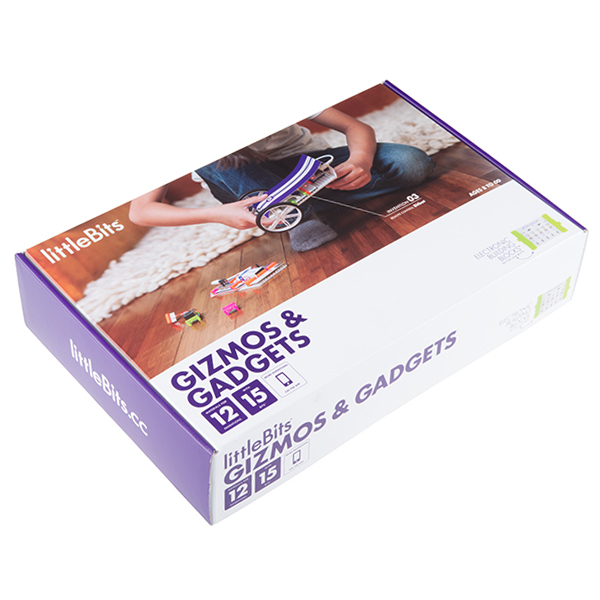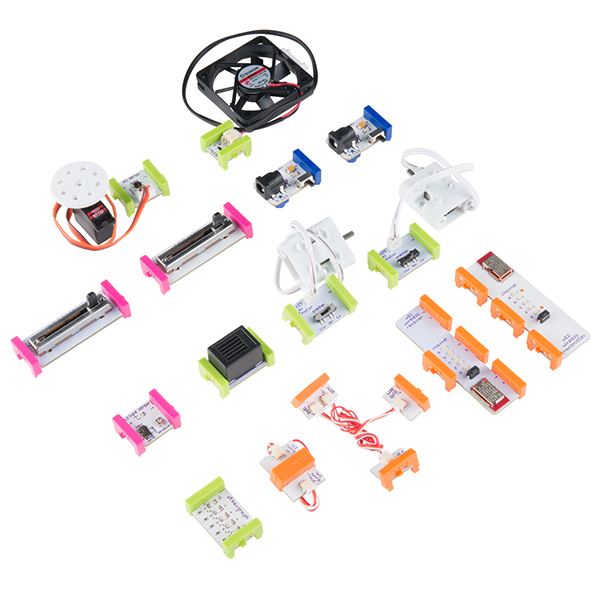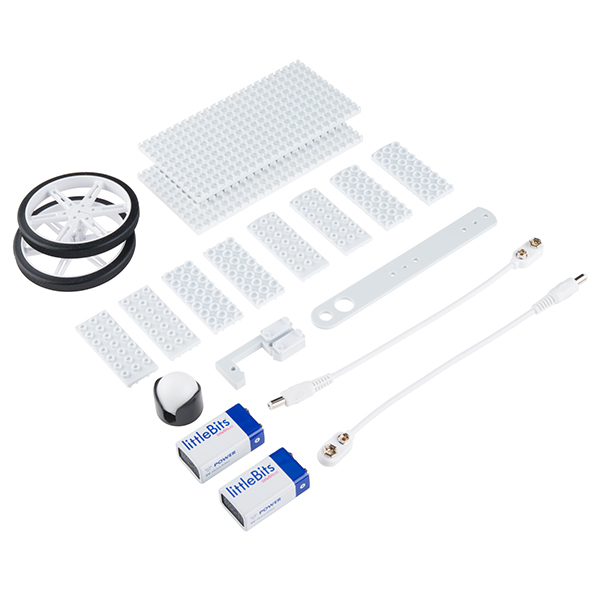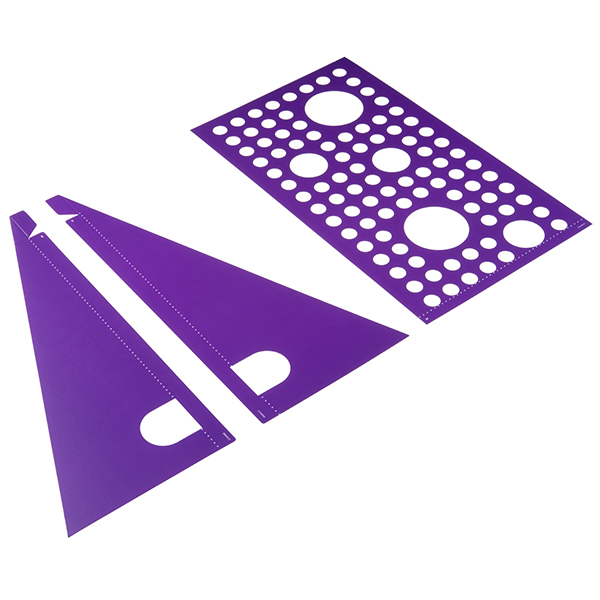littleBits Gizmos and Gadgets Kit
The littleBits Gizmos and Gadgets Kit is the ultimate invention toolkit that contains everything you need to design and create large, powerful projects just by snapping a few magnets together. Included in the Gizmos and Gadgets Kit are 15 littleBits modules that can be attached together by the power of magnets, a 9V alkaline battery and cable, a full-color instruction booklet with 12 fun projects to create, and all the accessories and tools to make them. With this kit you will be able to easily make a multitude of projects including: a remote controlled racecar, an automatic bubble blower, or even a wireless doorbell! All of this comes in a large cardboard box that is perfect for storage and transportation purposes.
littleBits is a library of discrete electronic components pre-assembled in tiny circuit boards. These simple, intuitive, space-sensitive blocks make prototyping with sophisticated electronics a matter of snapping small magnets together. With a growing number of available modules, littleBits aims to move electronics from late stages of the design process to its earliest ones, and from the hands of experts, to those of artists, makers, students and designers.
Each "Bit" is a piece of an electronic circuit. The bits are color coded and divided into 4 categories: power (blue), input (pink), output (green), and wire (orange). By combining the modules in different ways (by simply "snapping" them together magnetically) you can quickly create any number of interactive electronic projects.
- 1x Fan Bit
- 2x Slide Dimmer Bit
- 1x Buzzer Bit
- 1x Light Sensor Bit
- 1x Bargraph Bit
- 2x Power Bit
- 1x Servo Bit
- 1x Split Bit
- 1x Wire Bit
- 2x DC Motor Bit (tethered)
- 1x Wireless Receiver Bit (5 Channel)
- 1x Wireless Transmitter Bit (5 Channel)
- 2x 9V Alkaline Battery
- 2x 9V Barrel Jack Cable
- 1x Screwdriver
- 2x motorMate
- 2x powerSnap
- 1x Servo Accessory Pack
- 1x Servo Hub
- 2x Mounting Board
- 8x Brick Adapter
- 12x Brick Shoes
- 2x Wheel
- 1x Servo Mount
- 1x Mechanical Arm
- 1x Ball Caster
- Project Template, Glue Dot, and Sticker Sheets
- Full-color Instruction Booklet
- Instruction Booklet
- littleBits Invention App
- Product Page
- GitHub (Design Files)
littleBits Gizmos and Gadgets Kit Product Help and Resources
Core Skill: Robotics
This skill concerns mechanical and robotics knowledge. You may need to know how mechanical parts interact, how motors work, or how to use motor drivers and controllers.
Skill Level: Rookie - You will be required to know some basics about motors, basic motor drivers and how simple robotic motion can be accomplished.
See all skill levels
Core Skill: DIY
Whether it's for assembling a kit, hacking an enclosure, or creating your own parts; the DIY skill is all about knowing how to use tools and the techniques associated with them.
Skill Level: Noob - Basic assembly is required. You may need to provide your own basic tools like a screwdriver, hammer or scissors. Power tools or custom parts are not required. Instructions will be included and easy to follow. Sewing may be required, but only with included patterns.
See all skill levels
Core Skill: Electrical Prototyping
If it requires power, you need to know how much, what all the pins do, and how to hook it up. You may need to reference datasheets, schematics, and know the ins and outs of electronics.
Skill Level: Rookie - You may be required to know a bit more about the component, such as orientation, or how to hook it up, in addition to power requirements. You will need to understand polarized components.
See all skill levels
Comments
Looking for answers to technical questions?
We welcome your comments and suggestions below. However, if you are looking for solutions to technical questions please see our Technical Assistance page.
Customer Reviews
No reviews yet.






I'm an electrical engineer with boys in gradeschool (K and 3rd), and bought this kit for Christmas for all of us to play with. I was instantly hooked, not because I thought it was cool...but because how fast my kids picked it up. Their horizon of "things I can now do" expanded more than I could possibly of imagined. After 3 days of constant play I leveled up and bought two cloudbits and more power options. We now have multiple fixed littlebit installations revolving around the house. The latest was a chore-done-o-meter. Yes it's $200, but the value is twice that given the possibilities it provides grade school kids. My one gripe, is that the not-lego type of latching interconnect between the bits themselves and a base board more or less sucks...toss it. But the rest of the system is inspiring design, and worthy a review on their Githup repo.
If you get in touch with littleBits about their board, they'll put you on a list to get new ones sent out. There have been some manufacturing issues that caused some boards to basically just pop the bits off of them.
If SparkFun is going to sell LittleBits, they should really consider selling Snap Circuits too. We own both in our house, but we stopped buying LittleBits after 1 set (the synth set) and have continued to buy at least 6 more Snap Circuit sets. I think both the monetary value and the educational value are much greater with Snap Circuits. My 6 year old feels like he's doing experiments with the Snap Circuits, whereas he approaches the LittleBits as just a toy. Accordingly, the Snap Circuits get much, much more attention in our house. The LittleBits are definitely a little "hipper" looking product, and I appreciate that their electronic circuits are open-source, but the magnetic connection concept, one of the few proprietary aspects, leaves something to be desired, as we're continually having to re-seat the components, especially with any amount of movement of the creation. Considering all of this and the fact that LittleBits components cost roughly 10x what Snap Circuit components do, Snap Circuits seem to fit better with the SparkFun ethos.
Each product has a different focus. Snap Circuits is more about building circuits. LittleBits are more about the ideas of data flow. I would not lump them into the same category.
You know, I just looked into them and they do indeed look interesting. We will look into them. Thanks for the advice!
Yikes! $200?!